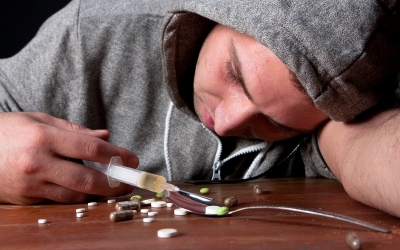Drug addiction: What Causes it?
Drug addiction is defined by the dependence on either a medication or an illegal drug. Because you’re addicted, you’re unable to control your use of the drug and the issue spirals out of control until you will do absolutely anything in order to take the next hit. Though you may want to quit, most people are incapable of doing so on their own. Such a problem generally begins as a simple and casual use of a drug – the dependence quickens and develops into a serious, long-term problem which brings with it a whole new set of problems, such as the effect it has on your physical and mental health, your relationships and your career. In some cases, even the law. Most people with a drug addiction require the support of family, friends, or medical professionals in order to quit their reliance on drugs. As your addiction to a certain drug becomes stronger, you may find that it becomes increasingly difficult to go for even short periods without it – stopping brings withdrawal symptoms which can make you feel physically ill.
The symptoms of a drug addiction can be characterised by feeling that you need to take the drug regularly in order to get through the day, failing in attempts to stop using it, spending a lot of money on drugs even when you can’t afford it, feeling that drugs are a solution to your problems, making certain that you maintain a constant supply of it, putting yourself in risky situations in order to obtain a drug, or focusing increasing amounts of time and energy on getting and taking drugs. Often it can be difficult to differentiate from some of the symptoms of drug addiction in teenagers, as hormones mean that their moodiness or angst could be just a hormonal issue, rather than an addiction. However, it is possible to identify it through noticing whether they are having problems at school, such as missing a lot of time or classes; physical health issues, such as a lack of energy or motivation to do anything; neglect in their appearance, such as a lack of interest in personal hygiene or their clothing, and changes in their behaviour.
There are certain symptoms which are more prevalent with particular types of drugs, such as the physical and behavioural signs attributed to one type of dependence. For example, those taking marijuana may have a heightened sense of taste, auditory or visual perception, poor memory, difficulty concentrating, red eyes and a paranoid way of thinking. However, barbiturates and bensodiazepines such as Vallium, Xanax and Anytal lead to a lack of coordination, slurred speech, drowsiness and confusion. If you’re struggling to stop using a drug, or have become addicted to taking drugs in general, you should seek medical advice as soon as possible in order to seek treatment for your addiction. Your local GP is a great place to start, as they can point you in the direction of other professionals who can help you receive therapy and treatment for your condition. Speaking up about your problems is the first step, as loved ones and friends may not be aware of the problem you’re facing. This is the same for those who are noticing a friend or family member who they believe may have an addiction – waiting only leads to the problem getting worse. There are many routes to treatment in order to combat this problem, so there is no need to feel as though nothing can be done. There are plenty of services available to help those in need.

Comments are closed.